- Home
- Anna Kavan
I Am Lazarus (Peter Owen Modern Classic) Page 4
I Am Lazarus (Peter Owen Modern Classic) Read online
Page 4
Now it was this town girl he had met on leave in the city to whom he had to attend. She was a good-looking girl; and perhaps before the glass closed round him he had felt something for her, but now there was just this impossible thing, this effort he could not make He knew he ought to explain something. She was trying to be sweet and kind to him. But he knew he could never do the impossible thing. And just then it occurred to him that he was shaking under his khaki coat.
‘What is it, Lennie?’ she asked him.
‘Nothing,’ he said. ‘It's cold standing around. Let's walk into town and get tea there. Let's get away from the sea.’
‘Don't you like the sea any more?’ she asked. She was looking at him walking away from the cliff, and biting her lip.
‘No,’ said the man. ‘I don't think so. I think I hate it.’
But then, feeling the hollow, vague coldness inside the glass,, and going away from the sea, there was nothing at all left and nothing mattered at all.
‘I don't feel anything about it,’ he said. ‘I don't feel anything about anything.’
On the way to the town she took his arm and they walked like that for a bit while he thought of the effort which he was required to make. He had known all the time he would not be able to make it. He knew that he had to do this tremendous thing and he wanted to do it and it was his duty to do it; but he knew that it was impossible, that he would never make the attempt now, and soon she unlinked her arm and began telling him about a picture with Spencer Tracy.
In the tea place where they sat down together it was half dark already and lamps were lighted. Drinking strong tea, with no anxiety left except the ache of the unmade and abandoned effort, the girl pouring the tea, the warmth of it spreading through him, he could feel the beginning of comfort after the dusk and the sea wind. While the waitress fastened the blackout they drank and just as the blackout was fixed and it was impossible to see out any longer, something thundered outside with a noise like a heavy sea and the man started and slopped his tea in the saucer.
‘The buses stop just outside here,’ the girl said. ‘It's the market place and they all stop here.’
‘What a filthy row,’ he said, feeling the evil sickness on him again, knowing that he was shaking again under his coat. So this was how he lived now, getting jittery because a bus pulled up near. Well, he was not going on like that. It was not good enough. The one person who could help him had not appeared. He probably never would. But there must be some other way. He knew that there was another way although for the moment he couldn't think what it was. Soon it would come back to him, in a minute he would remember the way out, the way where he was going.
‘Are you feeling all right?’ the girl said. She had put her arms on the table and was leaning towards him.
‘Of course.’
‘Why don't you eat your cake?’
‘I'm going to.’
The cake was too dry. He had to hold it in his mouth after he'd chewed it and then by taking a gulp of tea he was just able to wash it down without retching.
He put the cup carefully back on the saucer so that it didn't rattle. The girl touched his hand with her fingers.
‘Don't you like me any more either?’ she said.
‘I can't explain,’ he said. ‘I can't help it.’
The sickness had come up in his throat now and his lungs, and he could feel it strangling him and he was drowning again in the four-mile-deep icy horror of sickness or water. He looked at the girl and saw that she was crying.
‘It's no good. I can't do it,’ he said.
Then he pushed back his chair and stood up quickly because, just then, he saw the young man's face in a mirror up on the wall, he saw the thick wind-ruffled hair and the little scar on the cheekbone. The face moved in the mirror and when he looked round he could not see it anywhere in the room, and when he wanted to call out the sickness choked him, and now he tried to fight off the icy sickness, but like whales the waves of it fell on him till he was pounded and drowned, and while he froze suffocating and could not move or breathe, he heard the girl say, ‘Where are you going?’ and then he was able to move suddenly, and he got out of the tea-room.
It was evening and too dark to distinguish faces when he was in the street.
I wouldn't recognize him even if I knew which way he had gone, the man thought, hurrying along the dark streets, looking at the strange people he passed in the dark, who passed without looking at him. Once a bus went roaring by with a smell of burnt oil and he felt the sickness coming at him again but he fought it back and walked faster and it was all right and he was only a hollow man walking in the darkness without objective. Once a stranger asked him where he was going, but he went on without stopping to think that he did not know the answer. And once somewhere far off in the dark something hurt for a second because of the girl left alone and crying: but that was over immediately.
Then he was out of the town and the moon was up but behind cloud and it was less dark, and then he was walking on grass and he could see the heavy black swelling shapes of the downs, and the clouds sculptured in towers and bastions and battlemented with the light of the climbing moon. Then there was first the smell and then the sound of the sea. Then there were cliffs and the cold tumultuous restless water beneath.
Then instead of hurrying he was standing still, he was very tired now and sweating under the heavy coat, and looking up he saw a white shining fan, spreading over the sky, like light from a door slowly opening, and he knew the moon was coming out of the clouds. Then he looked over the sea and there were islands it seemed, and then a great migration of birds thickened the air and he was in a rushing of wings, the wings beat so dark and fast round him he felt dizzy like falling and the moon disappeared. And then it was clear again, brilliant moonlight, and there, ahead, bright as day, were all the small islands, Cape Promise, and the bay of Mairangi, wide, still, unbelievably peaceful under the full moon. And then he did know where he was going.
THE BLACKOUT
‘I CAN'T remember anything that happened,’ the boy said. ‘It was like a blackout, sort of.’
He twisted his thin body uneasily on the couch where he was lying, and for a second his face, which seemed much too startled and meek and vulnerable for a soldier's face, was turned up towards the doctor sitting beside him; then he looked very quickly away.
Queer sort of looking bloke for a doctor, he thought, noticing transiently beside his shoulders the crossed legs in shabby grey trousers, the worn brogues with mended soles. He wished that the doctor were not there. The doctor's presence made him uneasy, although there was nothing to cause uneasiness about the look of the man.
The couch was comfortable. If he had been alone in the room the boy would have quite enjoyed lying there with a pillow under his head. The room was small and there was nothing at all alarming about it. The walls were pale green, enclosing no furniture but the couch, the chair on which the doctor sat, and a desk. There was a calendar with a bright picture hanging over the desk. The boy could not see what was in the picture because, in order to look at it properly, he would have had to turn his head round in the doctor's direction. The sun was shining outside the window which was open a bit at the top. The glass panes had been broken in a raid and replaced by an opaque plastic substance so that you couldn't see out. The boy wondered what was outside the window. He thought he would like, vaguely, to get up, open the bottom half of the window, and have a look: and also to examine the picture on the calendar. The presence of the doctor prohibited him from doing these things, so he looked down at his hospital tie and began fidgeting with the loose ends of it. The tie had been washed so often that it had faded from red to deep pink and the cotton fabric had a curious dusty pile on it, almost like velvet, which communicated an agreeable sensation to the tips of his fingers.
‘Which is the last day you can remember clearly?’ the doctor asked.
‘The day I was due to rejoin my unit,’ the boy said, reluctantly detaching a fragment of his
attention from the pleasant feel of the tie.
‘Do you remember what date it was?’
‘September the eleventh.’ He wasn't likely to forget that date, so hypnotically, fascinated with dread, he had watched it racing towards him through the telescoped days of his embarkation leave.
‘Do you know what the date is to-day?’
He shook his head, looking down at the tie, and his very fine, limp hair fluffed on the pillow where it was longest on the top of his head.
‘It's the eighteenth. You started remembering things when you were brought in here yesterday: so that means your blackout lasted five complete days, doesn't it?’
‘Yes, I suppose so,’ the boy said; and waited, in apprehension, for the bad part to begin.
Why can't they leave you alone? he was thinking. Why must they go on poking and prodding at you when all you wanted was to be left in peace? It wasn't as if you would ever be able to tell them what they wanted to know, or as if they'd ever understand if you did. His fingers, pleating the ends of the tie, gripped more abruptly the softness from which they no longer derived any satisfaction.
‘You remember everything that happened while you were on leave quite distinctly?’ the doctor asked him.
‘Yes, oh yes,’ the boy said at once, speaking fast, as if he hoped, by bringing the words out quickly, in some way to terminate the matter without touching on what was most painful.
‘And where did you spend this leave?’
There now, it's begun now, the bad part's beginning, he thought in himself. And recognizing helplessly the preliminary movement of that thing which from the outset had filled him with a profound unease he remained silent now, while his mind ran from side to side, seeking the unknown avenues of defence or escape.
‘Well, where did you spend your leave?’
The doctor's voice was casual and almost friendly, but there was much firmness in it, and also there came along with it the dangerous thing preparing to launch its attack, which could not be trifled with.
‘I went home to my auntie,’ the boy said, whispering.
Like looking back down a long tunnel he began remembering now that tenement place off the Wandsworth Road, the water-tap out on the landing and the room always chockablock with the washing and cooking and the dirty dishes and pots that his mum never could keep upsides with, what with her heart, and his dad coming in drunk as often as not and knocking her about till the neighbours started opening their doors and threatening to call a policeman: and himself feeling shaky and sick and trying not to make a noise with his crying as he hid there crouched up in a ball of misery under the table. His auntie used to come visiting sometimes when his dad was away, and she was not old at all, or frightening or frightened at all, but so pretty and young and gay, that maybe that was the reason he always thought the word auntie was a word you used as a kind of endearment, in the way sweetie and honey were used. When he was eight years old his dad got t.b. and gave up the drink, but it was too late then, his mum was dying already, and when his dad died later on in the san he felt only happier than he had ever been in his life because he was going to live with his auntie for ever and ever and there would be no more shouts or rows or crying or staring neighbours.
He remembered the little dark house where the two of them lived then in Bracken's Court; tiny and old-fashioned and a bit inconvenient it was with those steep stairs with a kink in them where his dad would surely have broken his neck if he'd ever come there after closing time: but cosy too, like a dolls’ house, and they'd always been happy in it together, even after the arthritis stopped his auntie from going out to her dressmaking. When he left school he'd been taken on as messenger at the stationer's, and later had got a salesman's job inside the shop and worked hard and was getting along well, so that it hadn't seemed to matter too much that she could do less and less of the work they sent her at home, because he was earning almost enough to take care of them both and soon it would be more than enough the way things were going. Then the war had come, and she had got worse, she had those bad headaches often and couldn't manage the crooked stairs. Then he had been called up and he had hated it all, hated the army, hated leaving home, hated losing his good job, hated the idea of being sent overseas to fight: but most of all hated leaving her badly off now, financially insecure, bombs falling perhaps, and she alone with her crippling pains and no one reliable to take care of her; she who had always been sweet and lovely to him, and deserved taking care of more than anyone in the world. When he thought of what might become of her if he were taken prisoner or killed it was more than he could bear and he almost wished she were safely out of it all. Yes, when she went down with ’flu or whatever it was during his last leave, he almost hoped she wouldn't get well, it broke his heart so to leave her like that. But these were some of the things which never could be explained and he only wished to be left alone and not be made to remember.
But the questions had to go on.
‘What are the last things you remember doing before you left your aunt's house that final day?’ the doctor wanted to know.
‘I spent a goodish time straightening up and cleaning the place so as to leave everything shipshape,’ the boy said. ‘My auntie being an invalid more or less I wanted to leave things as easy for her as I could.’
Out of the end of his left eye he could see the doctor's crossed knees and the feet in their mended shoes, and for an instant rebellion rose in him because this was a man no different from himself who by no divine right of class or wealth or any accepted magic sought to force memory on him. But there was something beyond that: beyond just the man who could be opposed with obstinacy there was the frightening thing which he had to fight in the dark, and he knew that he dared not remain silent because his silence might be to that thing's advantage, and he went on, speaking low and mumbling as if the words came out against their will.
‘We had tea about four. Then I went up and packed my kit. Then it was time to go for the train. I said good-bye and started for the station. King's Cross I had to go from.’
There was a long pause, and at the end of it came the doctor's voice asking if that was the last thing he could remember, and the boy's voice telling him that it was, and then there was silence again.
‘That's queer,’ the boy said suddenly into this silence. And now his voice sounded changed, there was astonishment and dismay in it, and the doctor uncrossed his knees and looked at him more closely, asking him, ‘What's queer?’
‘I've just remembered something,’ the boy said. ‘That time I told you about when I left the house, it wasn't the last time, really.’ ‘Not the last time you were in the house?’
‘No. I've just remembered. It's just sort of come back to me somehow. When I'd gone part of the way to the station I found I'd left something important behind, my pay-book I think it was, and I had to sprint back to fetch it.’
The doctor took a packet of cigarettes out of his pocket and lighted one with his utility lighter which never worked the first time he thumbed it, and blew out a little smoke. He seemed in no hurry at all about asking the next question.
‘Can you remember how you were feeling when you went back?’
‘I suppose I felt a bit flustered like anyone would about leaving my pay-book,’ the boy said, defensive suddenly, and blindly suspicious of some unimagined trap.
Looking into the tunnel he remembered fumbling under the mat for the key which was left there for the next-door woman who came in to give a hand. Was it as he came in or as he was going out again that he stood at the foot of the stairs where they crooked in the angle of a dog's hindleg out of the living-room? It was dusk, and he remembered the silence inside the house as though there were a dead person or somebody sleeping upstairs. Yes, she must have been asleep then, he thought: but whether he went up to her was not in the memory, but only the noise of his army boots clattering away on the paving-stones of the court, and as he came out into the high street a church bell was ringing.
The doctor
asked, ‘What happened afterwards?’
‘I can't remember anything more,’ the boy said.
‘Nothing whatever? Not even some isolated detail?’
‘Yes,’ he said, after a while. ‘I think I remember looking for the station entrance, and a big bridge with a train shunting on it up high.’
He was aware, just then, of danger skirmishing all about in the green-walled room, and lying there on the couch his eyes were still down where they seemed safe on the pink ends of the tie, his hands clenched now and his neck and shoulders gone tense; and he not knowing if it were through his words or his silence that the danger would strike.
Why did a church bell keep ringing in the tunnel like that? It was a very deep tunnel into which he was being forced. He did not want to go down in the tunnel again. He was afraid. But because of the unknown thing whose immediate agent was the casual, near friendly voice nothing could save him from that black exploration split by the doleful and ugly clang of a distant bell.
‘As if someone had died,’ he said out loud.
‘Who do you think might have died?’
No, no. Not that. Don't let it come, the boy thought, fighting desperately against what had all the time been waiting there behind every word; the worst thing, the intolerable pain, the fear not to be borne. And at once his nerves started to twitch and tears sprang in his eyes in case she might not have been sleeping but dead in the silent room at the top of the steep stairs, investigated or not by him he was, agonizingly, somehow unable to know.
Running in panic along the tunnel he remembered the alley-way, like something in a film he'd seen once, blank walls leaning nearer and nearer to suffocation, and, at the bend, a lamp-bracket sticking out with a dangling noose; only no corpse was at the end of the rope. And always the hurrying army boots and the bell ringing, till he did not know if it was the noise of his own steps or the church bell clanging inside his head. The noise was part of his hunger, and he remembered, further along the tunnel, scrounging about at night where a street market had been and finding, finally, in the gutter, a piece of sausage, grey, slimy, like the wrist of a dead baby, and the terrible thirst that came on him afterwards, and how he drank out of a horse-trough, scooping the water up with his hands, and it seemed all wrong because they killed animals painlessly. Then there was that open space, a heath or a common, where he had vomited and lain on the ground, his hair in the rough grass. He felt weak and stiff from the vomiting and clouds of insects were round him, settling on his face and hands and crawling over his mouth because he was too weak to flap at them, but in the end it got dark and the insects went away then and left him in peace.

 Machines in the Head
Machines in the Head Ice
Ice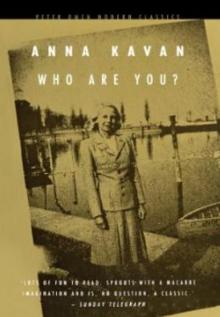 Who Are You?
Who Are You?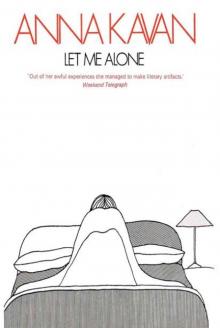 Let Me Alone
Let Me Alone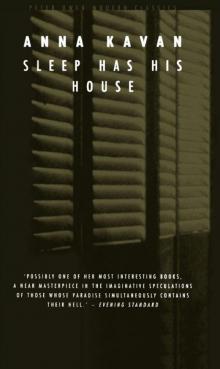 Sleep Has His House
Sleep Has His House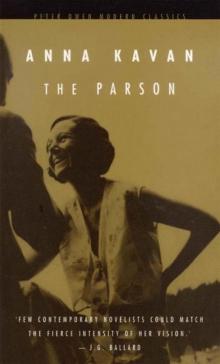 The Parson (Peter Owen Modern Classic)
The Parson (Peter Owen Modern Classic)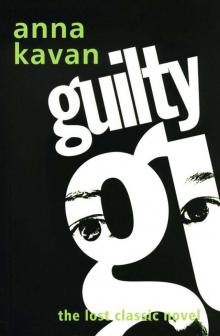 Guilty: The Lost Classic Novel
Guilty: The Lost Classic Novel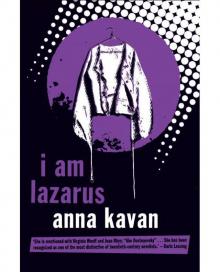 I Am Lazarus (Peter Owen Modern Classic)
I Am Lazarus (Peter Owen Modern Classic)